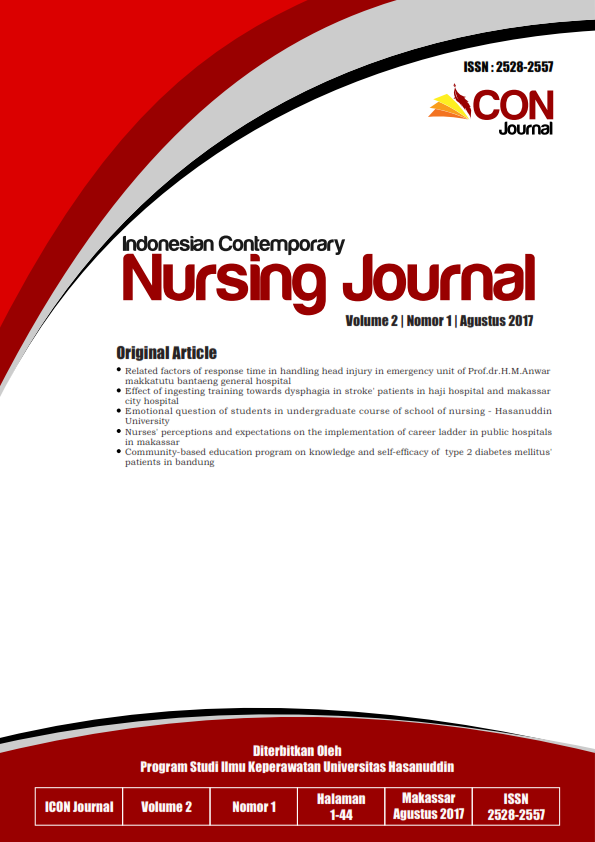Community-Based Education Program on Knowledge and Self-Efficacy of Type 2 Diabetes Mellitus’ Patients in Bandung
DOI:
https://doi.org/10.20956/icon.v2i1.3583Abstract
Introduction. Type 2 Diabetes Mellitus was a chronic disease have complicated. Amount of patient Type 2 Diabetes Mellitus (DM) was increased. Knowledge and self-efficacy is mainly important for self-care behavior. The purpose of this study was aimed to examine knowledge, and self-efficacy among patients with Type 2 DM in Bandung, Indonesia. Methods. The research was a quasi-experimental with pre and posttest control group. Sixty two type 2 DM were recruited from 8 working area Primary Health Centers in Bandung who have diagnosed DM, using purposive sampling technique. Knowledge questionnaire from Michigan Diabetes Research and Training Center’s Brief Diabetes Knowledge Test, Self-efficacy were measured by the developed Stanford Patients Education Research Center. Both of questionnaires comprised five dimensions: nutrition, sport and activity, drugs and glucose monitoring. Patients of in intervention group received 2 weeks Diabetes Mellitus education program be given healthcare workers. Techniques used in this program consisted of community-based education, goal setting, follow-up and face-to-face interview. Data were analyzed by independent t-test. Results. There are significantly different of knowledge and self-efficacy after community-based education program in intervention (M = 9.26, SD = 2.8 ; M = 53.26, SD = 10.50) and control group (M = 7.39, SD = 2.4; M = 36.74, SD = 4.49). This study revealed that community-based education program significantly improved self-efficacy (p=0.000) but not improved for knowledge (p=0.180). Conclusion. These findings indicated that Knowledge and Self-efficacy of type 2 Diabetes Mellitus patients in Bandung required improvement. Therefore, further study regarding the effective in improving knowledge and self-efficacy type 2 Diabetes Mellitus is extremely needed.
References
American Diabetes Association. (2010). Fitness. Available at :http://care.diabetesjournals.org (Diakses pada 28 Juni 2013)
________. (2013). Physical Activity is Important. Available at :http://care.diabetesjournals.org (Diakses pada 28 Juni 2013)
Bantle, J.P., Juddith, W.R., Ann, L.A., Caroline, M.A., Nathaniel, G.C., Marrion, J.F., Byron, J.H.,et al. (2008). Nutrion Recommendation and Interventions for Diabetes. Available at : diabetesjournals.org (diakses pada 26 Juni 2013)
Bodenheimer T, Lorig K, Holman H, Grumbach K. 2002. Patients Self Management of Chronic Disease in Primary Care. American Medical Association (reprinted) JAMA,Vol 288,No. 19. Available : http://jama.ama-assn.org/content/288/19/2469.full.pdf+html
Depkes RI. 2009. Tahun 2030 Prevalensi Diabetes Melitus di Indonesia Mencapai 213 juta Orang Tahun (online). Available : http://www.depkes.go.id/index.php/berita/press-release/414-tahun-2030-prevalensi-diabetes-melitus-di-indonesia-mencapai-213-juta-orang.html
Depkes RI. 2010. Diabetes Melitus dapat Dicegah (online). Available : http://www.depkes.go.id/index.php/berita/press-release/1314-diabetes-melitus-dapat-dicegah.html
Funnel MM and Anderson RM. 2004. Empowerment and Self Management of Diabetes. Clinical Diabetes- Volume 22, Number 3, 2004. Available : http://clinical.diabetesjournals.org/content/22/3/123.full.pdf+html
Friedman MM, Bowden VR, Jones EG. 2010. Buku Ajar Keperawatan Keluarga Riset, Teori, Praktek. EGC, Jakarta.
Jack Jr L, Liburd L, Tirzah S, Airhihebbuwa CO. 2004. Understanding the Environmental Issues in Diabetes Self-Management Education Research : A Reexamination of 8 Studies in Community-Based Settings. Annals of Internal Medicine Volume 140 Number 11. Available http://www.annals.org/content/140/11/964.full.pdf
Kurniawan T, Sae-Sia W, Maneewat K, Petpichetchian W. 2011. The Effect of a self management Support Program on The Achievemnet Goal in Diabetic Foot Care Behaviours in Indonesian Diabetic Patients. Nurse Media Journal of Nursing, 1, 2 , 195-210.
Lincoln NB, Radford KA, Game FL, Jeffcoate WJ. 2008. Education for Secondary Prevention of Foot Ulcers in people with Diabetes : a randomized Controlled Trial. Diabetologia, 51, 1954-1961.
McGowan, P. 2011. The Efficacy of Diabetes Patient Education and Self-Management Education in DM type 2. Canadian Journal of Diabetes35 (1) 46-53.
Perkeni. 2011. Penatalaksanaan Diabetes Melitus. PB. Perkeni. Jakarta.
Riskesdas. (2007). Laporan Nasional Kesehatan 2007. Available at : google.com (diakses 06 Desember 2012)
Sari, CWM, Haroen H, Nursiswati. 2012. Pengaruh program edukasi berbasis keluarga terhadap perilaku perawatan kaki pada pasien Diabetes Melitius di Wilayah Puskesmas Pasirkaliki Bandung. Thesis Pasca Sarjana BKU Komunitas Universitas Padjadjaran. Tidak dipublikasikan.
Smeltzer and Bare. (2002). Buku Ajar Keperawatan Medikal Bedah Brunner&Suddarth edisi 8. Jakarta: EGC.
Soegondo, S. (2006). Penatalaksanaan Diabetes Mellitus Terpadu. Jakarta : FK UI
Sudoyo, dkk. (2007). Buku Ajar Ilmu Penyakit Dalam. Jakarta : Pusat penerbitan Ilmu Penyakit Dalam FK UI
Susanti, S; Haroen H; Juniarti N. 2011. Pengaruh Diabetes Self Management Education (DSME) berbasis keluarga pada tingkat perawatan diri Pasien Diabetes Melitus di Kota Bandug. Tesis. Tidak dipublikasikan .
Toobert, D.J.,Sarah E.H.,Russell E.G. (2000). The summary of diabetes self-care activities measure. Diabetes Care, 23(7), 943-950 Available at : Proquest (diakses pada 02 Januari 2013)
Vatankhah N, Khamseh ME, Noudeh YJ, Aghili R, Baradaran HR, Haeri NS. 2009. The Effectiveness Of Foot Care Education on People With Type 2 Diabetes in Tehran, Iran. Primary Care Diabetes 3, 73-77.
World Health Organization. (2010). Diabetes. Available at:http://www.who.int/topics/diabetes-melitus (diakses pada 03 Oktober 2012
Downloads
Published
How to Cite
Issue
Section
License
Authors who publish with this journal agree to the following terms:Authors retain copyright and grant the journal right of first publication with the work simultaneously licensed under a Creative Commons Attribution License that allows others to share the work with an acknowledgement of the work's authorship and initial publication in this journal.
Authors are able to enter into separate, additional contractual arrangements for the non-exclusive distribution of the journal's published version of the work (e.g., post it to an institutional repository or publish it in a book), with an acknowledgement of its initial publication in this journal.
Authors are permitted and encouraged to post their work online (e.g., in institutional repositories or on their website) prior to and during the submission process, as it can lead to productive exchanges, as well as earlier and greater citation of published work (See The Effect of Open Access).



